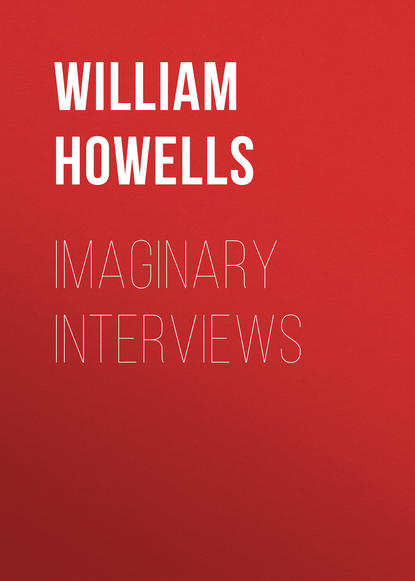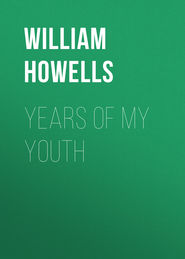По всем вопросам обращайтесь на: info@litportal.ru
(©) 2003-2024.
✖
Imaginary Interviews
Настройки чтения
Размер шрифта
Высота строк
Поля
The supper has always been considered rather a refinement upon the banquet, in taste, as it was offered to the venerable poet not upon the occasion of any achievement of his own, but in recognition of the prolonged triumph of his brother dramatist, in which it was assumed that he would feel a generous interest. The banquet to Themistocles was more in the nature of a public rejoicing, for it celebrated a victory due as much to the valor of all the Greeks as to the genius of the admiral; and it could, therefore, be made more directly a compliment to him. Even under these circumstances, however, the guest of the evening occupied an inconspicuous place at the reporters' table, while he was represented on the chairman's right by the bust of Poseidon, hastily modelled for the occasion by Praxiteles, and dedicated to Themistocles, who was a plain man, but whose portrait, even if he had been handsome, it was thought would not have looked well in such a position at a time when portrait-statuary was unknown. The only direct allusion to him was in the opening toast, "The Dewey of Our Day," which was drunk sitting, the guests rising from their recumbent postures in honor of it. The chairman's opening address was almost wholly a plea for the enlargement of the Athenian navy: the implication that the republic had been saved, in spite of its inefficient armament, was accepted as the finest possible compliment to the guest of the evening. The note of all the other speeches was their exquisite impersonality. They got further and further from the occasion of the evening, until the effort of Demosthenes closed the speaking with a scathing denunciation of the machine politicians who had involved the Athenians in a war with Persia to further the interests of Sparta. It was held that this was the noblest tribute which could be paid to the genius of the man who had brought them safely out of it. As the company broke up, Diogenes with his lantern approached Themistocles, who was giving the reporters copies of the speech he had not been asked to deliver, and, after examining his countenance with a sigh of disappointment, accompanied him home as far as his own tub; Athens at that time being imperfectly lighted, and the reform government having not yet replaced the street names wantonly obliterated under the régime of the Thirty Tyrants.
At the supper to Æschylus the tablets of the menu were inscribed with verses from the elder poet ingeniously chosen for their imaginable reference to the masterpiece of the younger, whose modesty was delicately spared at every point. It was a question whether the committee managing the affair had not perhaps gone too far in giving the supper while Sophocles was away from Athens staging the piece at Corinth; but there was no division of opinion as to the taste with which some of the details had been studied. It was considered a stroke of inspiration to have on the speaker's left, where Sophocles would have sat if he had been present at a supper given to Æschylus, the sitting figure of Melpomene, crowned with rosemary for remembrance. No allusion was made to Æschylus during the evening, after his health had been proposed by the chairman and drunk in silence, but a great and exquisite surprise was reserved for him in the matter of the speeches that followed. By prior agreement among the speakers they were all ostensibly devoted to the examination of the Œdipus and the other dramas of Sophocles, which in his absence were very frankly dealt with. But the unsparing criticism of their defects was made implicitly to take the character of appreciation of the Æschylus tragedies, whose good points were all turned to the light without open mention of them. This afforded the aged poet an opportunity of magnanimously defending his younger confrère, and he rose to the occasion, beaming, as some one said, from head to foot and oozing self-satisfaction at every pore. He could not put from him the compliments not ostensibly directed at him, but he could and did take up the criticisms of the Sophoclean drama, point by point, and refute them in the interest of literature, with a masterly elimination of himself and his own part in it. A Roman gentleman present remarked that he had seen nothing like it, for sincere deprecation, since Cæsar had refused the thrice-offered crown on the Lupercal; and the effect was that intended throughout – the supreme honor of Æschylus in the guise of a tribute to Sophocles. The note of the whole affair was struck by the comic poet Aristophanes, whom the chairman called upon to make the closing speech of the evening, and who merely sat up long enough to quote the old Attic proverb, "Gentlemen, there are many ways to kill a dog besides choking him to death with butter," and then lay down again amid shrieks of merriment from the whole company.
There is, perhaps, a middle course between the American and Athenian ways of recognizing achievement in the arts or interests, or of commemorating great public events. This would probably derive from each certain advantages, or at least the ancient might temper the modern world to a little more restraint than it now practises in the celebration of private worth, especially. The public events may be more safely allowed to take care of themselves, though it is to be questioned whether it is well for any people to make overmuch of themselves. They cannot do it without making themselves ridiculous, and perhaps making themselves sick of what little real glory there is in any given affair; they will have got that so inextricably mixed up with the vainglory that they will have to reject the one to free themselves from the humiliating memory of the other.
There is nothing that so certainly turns to shame in the retrospect as vainglory, and this is what the personal dinner is chiefly supposed to inspire in the victim of it. If he is at all honest with himself, and he probably is before he can have done anything worthy of notice, he knows perfectly well that he has not merited all if any of the fond flatteries with which he is heaped, as he sits helpless with meat and drink, and suffers under them with the fatuous smile which we all have seen and which some of us have worn. But as the flatterers keep coming on and on, each with his garland of tuberoses or sunflowers, he begins to think that there must be some fire where there is so much smoke, and to feel the glow of the flame which he is not able exactly to locate. He burns in sympathy with his ardent votaries, he becomes inevitably a partner in his own apotheosis. It is the office of the sad, cold morrow, and the sadder and colder after-morrows, to undo this illusion, to compress his head to the measure of his hat, to remove the drawn butter from his soul.
They may never wholly succeed, but this is not probable, and it is not against a permanent folie des grandeurs that we need seek to guard the victim of a personal dinner. We have, indeed, so much faith in the ultimate discretion of the race that we should be quite willing to intrust the remarkable man himself with the office of giving himself a public dinner when he felt that his work merited signal recognition. In this way the whole affair could be kept within bounds. He could strike the note, he could set the pace, in his opening address; and, having appointed the speakers, with a full knowledge of their honesty and subordination, he could trust the speeches to be sane and temperate. In calling the speakers successively up, he could protest against anything that seemed excessive eulogy in the words already spoken, and could invite a more modest estimate of his qualities and achievements in the speeches to follow.
X
A DAY AT BRONX PARK
In the beginning of the season which is called Silly in the world of journalism, because the outer vacuity then responds to the inner, and the empty brain vainly interrogates the empty environment for something to write of, two friends of the Easy Chair offered to spend a holiday in search of material for a paper. The only conditions they made were that the Easy Chair should not exact material of weight or importance, but should gratefully accept whatever they brought back to it, and make the most of it. On these terms they set out on their labor of love.
By the time the sun had quitted the face of the vast apartment-house on which the day habitually broke, and had gone about its business of lighting and heating the city roofs and streets, the holiday companions were well on their way up the Third Avenue Elevated toward that region of the Bronx which, in all their New York years, they had never yet visited. They exulted at each stop and start of the train in the long succession of streets which followed so fast upon one another that the guards gave up trying to call them out as a hundred-and-so-many, and simply said Fifty-fifth, and Sixty-sixth, and Seventy-seventh Street. This slight of their duty to the public comported agreeably with the slip-shod effectiveness of the whole apparatus of the New York life: the rows and rows of shops, the rows and rows of flats, the rows and rows of back yards with miles of wash flying in the soft May wind, which, probably, the people in the open car ahead felt almost a gale.
When the train got as far as the composite ugliness of the ships and tugs and drawbridges of Harlem River, the companions accepted the ensemble as picturesqueness, and did not require beauty of it. Once they did get beauty in a certain civic building which fronted the track and let fall a double stairway from its level in a way to recall the Spanish Steps and to get itself likened to the Trinità de' Monti at Rome.
It was, of course, like that only in their fond remembrance, but this was not the only Roman quality in their cup of pleasure that day; and they did not care to inquire whether it was merely the flavoring extract of fancy, or was a genuine infusion from the Italian sky overhead, the classic architectural forms, the loosely straggling grass, the flowering woods, the rapture of the birds, the stretches of the river, the tumbling rapids, which so delicately intoxicated them. There was a certain fountain gave a peculiar authenticity to their pleasure, as of some assurance blown in the bottle from which their joy-draught was poured. Nowhere else but in Rome could they have imagined such a group of bronze men and maidens and web-footed horses struggling so bravely, so aimlessly (except to show their figures), in a shallow bowl from which the water spilled so unstintedly over white marble brims beginning to paint themselves palely green.
At the end of their glad day this fountain came last of the things that made Bronx Park such a paradise for eight hours; though it might have been their first delight if they had taken one way about instead of another in their tour of the large, easy pleasance. But suddenly at half-past eleven they found themselves ravenously hungry, and demanded to be driven to the best restaurant by the shortest way that the mild youth whom they fell to at once inside the park gate could find.
He had the very horse he ought to have had – old, weary, infirm, decently hiding its disabilities under a blanket, and, when this was stripped away, confessing them in a start so reluctant that they had to be explained as the stiffness natural to any young, strong, and fresh horse from resting too long. It did, in fact, become more animated as time went on, and perhaps it began to take an interest in the landscape left so charmingly wild wherever it could be. It apparently liked being alive there with its fares, kindred spirits, who could appreciate the privacy of a bland Monday after the popular outing of the day before. Almost nobody else was in the park. For a time they noted only a young fellow with a shut book in his hand taking his way up a woody slope and fading into a green shadow; but presently they came to a grassy point running down to the road, where, under a tree, there was a young mother sitting with an open book in her lap, and, a little way from her outstretched little foot, her baby asleep in the smallest of go-carts – the collapsible sort that you can fold and carry in the cars and then unfold for use when you come to the right place. The baby had a white sunbonnet, and a thick fringe of her straw-colored hair came out over her forehead under it, and when the companions smiled together at the baby, and the horse intelligently faltered, the young mother fluttered the idle leaves of her book with her hand and smiled back at them, and took the credit of the little one, not unkindly, yet proudly. They said it was all as nice as it could be, and they were still so content in her and her baby that, when they had to drive out of the park to cross a street to the section where the restaurant and the menagerie were, they waited deferentially for a long, long funeral to get by. They felt pity for the bereaved, and then admiration for people who could afford to have so many carriages; and they made their driver ask the mounted policeman whose funeral it was. He addressed the policeman by name, and the companions felt included in the circle of an acquaintance where a good deal of domesticity seemed to prevail. The policeman would not join in the conjecture that it was some distinguished person; he did not give his reasons; and the pair began to fret at their delay, and mentally to hurry that poor unknown underground – so short is our patience with the dead! When at last their driver went up round the endless queue of hacks, it suddenly came to an end, and they were again in the park and among the cages and pens and ranges of the animals, in the midst of which their own restaurant appeared. An Italian band of mandolins and guitars was already at noonday softly murmuring and whimpering in the corner of the veranda where the tables were set; and they got an amiable old waiter, whose fault it was not if spring-lamb matures so early in the summer of its brief term as to seem last-fall-lamb. There is no good reason either to suppose he did not really believe in the pease. But why will pease that know they have been the whole winter in the can pretend to be just out of the pod? Doubtless it is for every implication that all vegetation is of one ichor with humanity; but the waiter was honester than the pease. He telephoned for two wheeled chairs, and then said he had countermanded them because they would be half an hour coming; but again he telephoned, for by this time the pair had learned that they might drive into the zoological grounds, but not drive round them; and they saw from the window the sun smoking hot on the asphalt paths their feet must press.
While the chairs lingered on the way, they went to get what comfort they could from the bears, whose house was near at hand. They might well have learned patience here from a bear trying to cope with a mocking cask in a pool. He pushed it under the water with his paw and held it hard down; when he turned away as if that cask were done for, there it was bobbing about on the surface, and he had to down it again and hold it under till life seemed extinct. At last he gave it up and left it floating in triumph, but one could infer with what perseverance he would renew the struggle presently.
There might have been too many bears; but this was the fault of all their fellow-captives except perhaps the elephants. One cannot really have enough of elephants; and one would have liked a whole herd of giraffes, and a whole troop of gnus would not have glutted one's pleasure in their goat-faces, cow-heads, horse-tails, and pig-feet. But why so many snakes of a kind? Why such a multiplicity of crocodiles? Why even more than one of that special pattern of Mexican iguana which looked as if cut out of zinc and painted a dull Paris green? Why, above all, so many small mammals?
Small mammals was the favorite phrase of the friendly colored chairman, who by this time had appeared with an old-soldier comrade and was pushing the companions about from house to house and cage to cage. Small mammals, he warned them, were of an offensive odor, and he was right; but he was proud of them and of such scientific knowledge of them as he had. The old soldier did not pretend to have any such knowledge. He fell into a natural subordination, and let his colored superior lead the way mostly, though he asserted the principle that this is a white man's country by pushing first to the lions' house instead of going to the flying-cage, as his dark comrade instructed him.
It was his sole revolt. "But what," we hear the reader asking, "is the flying-cage?" We have not come to that yet; we are lingering still at the lions' house, where two of the most amiable lions in the world smilingly illustrate the effect of civilization in such of their savage species as are born in the genial captivity of Bronx Park. We are staying a moment in the cool stone stable of the elephants and the rhinoceroses and the hippopotamuses; we are fondly clinging to the wires of the cages where the hermit-thrushes, snatched from their loved solitude and mixed with an indiscriminate company of bolder birds, tune their angelic notes only in a tentative staccato; we are standing rapt before the awful bell-bird ringing his sharp, unchanging, unceasing peal, as unconscious of us as if he had us in the heart of his tropical forest; we are waiting for the mighty blue Brazilian macaw to catch our names and syllable them to the shrieking, shrilling, snarling society of parrots trapezing and acrobating about him; we are even stopping to see the white peahen wearing her heart out and her tail out against her imprisoning wires; we are delaying to let the flying-cage burst upon us in the unrivalled immensity promised. That is, we are doing all this in the personalities of those holiday companions, who generously found the cage as wide and high as their chair-men wished, and gratefully gloated upon its pelicans and storks and cranes and swans and wild geese and wood-ducks and curlews and sea-pigeons, and gulls, and whatever other water-fowl soars and swims. It was well, they felt, to have had this kept for the last, with its great lesson of a communistic captivity in which all nations of men might be cooped together in amity and equality, instead of being, as now, shut up each in his own cell of need and fear.
Not having come in an automobile, the companions were forced by an invidious regulation to find their carriage outside the gate of the Concourse; but neither the horse nor the driver seemed to feel the slight of the discrimination. They started off to complete the round of the park with all their morning cheerfulness and more; for they had now added several dollars to their tariff of charges by the delay of their fares, and they might well be gayer. Their fares did not refuse to share their mood, and when they crossed the Bronx and came into the region of the walks and drives they were even gayer than their horse and man. These were more used to the smooth level of the river where it stretched itself out between its meadowy shores and mirrored the blue heaven, rough with dusky white clouds, in its bosom; they could not feel, as their fares did, the novelty in the beauty of that hollow, that wide grassy cup by which they drove, bathed in the flowery and blossomy sweetness that filled it to its wood-bordered brim.
But what is the use of counting one by one the joys of a day so richly jewelled with delight? Rather let us heap them at once in the reader's lap and not try to part the recurrence of the level-branched dogwoods in bloom; the sunny and the shadowy reaches of the woods still in the silken filminess of their fresh young leaves; the grass springing slenderly, tenderly on the unmown slopes of the roadsides, or giving up its life in spicy sweetness from the scythe; the gardeners pausing from their leisurely employ, and once in the person of their foreman touching their hats to the companions; the wistaria-garlanded cottage of the keeper of the estate now ceded to the city; the Gothic stable of the former proprietor looking like a Gothic chapel in its dell; the stone mansion on its height opening to curiosity a vague collection of minerals, and recalling with its dim, hardwood interior the ineffectual state of a time already further outdated than any colonial prime; the old snuff-mill of the founders, hard by; the dam breaking into foam in the valley below; the rustic bridge crossing from shore to shore, with steel-engraving figures leaning on its parapet and other steel-engraving presences by the water's brink.
The supreme charm is that you are so free to all things in that generous park; that you may touch them and test them by every sense; that you may stray among the trees, and lie down upon the grass, and possess yourself indiscriminately of them quite as if they were your own.
They are indeed yours in the nobler sense of public proprietorship which will one day, no doubt, supersede all private ownership. You have your share of the lands and waters, the birds in the cages and the beasts, from the lions and elephants in their palaces, and the giraffes freely browsing and grazing in their paddock, down to the smallest of the small mammals giving their odor in their pens. You have as much right as another to the sculptures (all hand-carved, as your colored chairman will repeatedly tell you) on the mansions of the lordlier brutes, and there is none to dispute your just portion of the Paris-green zinc iguana, for you have helped pay for them all.
The key-word of this reflection makes you anxious to find whether your driver will make you pay him too much, but when you tot up the hours by his tariff, and timidly suggest that it will be so many dollars and offer him a bill for the same, he surprises you by saying, No, he owes you fifty cents on that; and paying it back.
Such at least was the endearing experience of the companions at the end of their day's pleasure. Not that it was really the end, for there was the airy swoop homeward in the Elevated train, through all that ugly picturesqueness of bridges and boats and blocks of buildings, with the added interest of seeing the back-flying streets below now full of children let loose from school for the afternoon, and possessing the roadways and sidewalks as if these, too, were common property like the park. It seemed to the companions that the children increased toward the shabbier waterside, and decreased wherever the houses looked better, through that mystical law of population by which poverty is richer than prosperity is in children. They could see them yelling and screaming at their games, though they could not hear them, and they yelled and screamed the louder to the eye because they were visibly for the greatest part boys. If they were the offspring of alien parents, they might be a proof of American decay; but, on the other hand, the preponderance of boys was in repair of that disproportion of the sexes which in the east of these States is such a crying evil.
Perhaps it was the behavior of the child in the opposite seat which made the companions think of girls as a crying evil; the mental operations are so devious and capricious; but this child was really a girl. She was a pretty child and prettily dressed, with a little face full of a petulant and wilful charm, which might well have been too much for her weak, meek young mother. She wanted to be leaning more than half out of the window and looking both ways at once, and she fought away the feebly restraining hands with sharp, bird-like shrieks, so that the companions expected every moment to see her succeed in dashing herself to death, and suffered many things from their fear. When it seemed as if nothing could save them, the guard came in and told the weak, meek mother that the child must not lean out of the window. Instantly, such is the force of all constituted authority among us, the child sat down quietly in her mother's lap, and for the rest of the journey remained an example to angels, so that the companions could rejoice as much in her goodness as in her loveliness. She became, indeed, the crown of their happy day, a day so happy that now in the faint air of August it is hard to believe it even of May.
THE END











